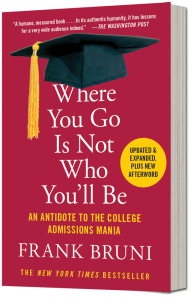It’s fitting that we have noted New York Times bestselling columnist author Frank Bruni coming to speak to our school community this week about his latest book, Where You Go Is Not Who You’ll Be. While many associate the term “March Madness” with the upcoming NCAA college basketball tournament, anyone who works in education knows that a different kind of madness grips parents around this same time of year: admissions madness.
Acceptance letters go out to new students at The Willows this week, and anxious parents nationwide await word from both K-12 independent schools and universities as well, crossing fingers in anticipation not just for acceptance at a school but also for the implied promise for the future this acceptance carries with it.
In his book, Bruni tries to reassure anxious parents that life will carry on even if one’s first choice is not realized. He quotes Anthony Carnevale, Georgetown’s Director of Center on Education and the Workforce:
Life is something that happens slowly, and whether or not they go to their first choice isn’t that important…It’s not the difference between Yale and jail. It’s the difference between Yale and the University of Wisconsin or some other school where they can get an excellent education.
While I hope this anxiety does not consume our middle school students and parents at The Willows applying out for secondary school, the reality for some is that not getting one’s first choice – or worse yet, not getting your second or third choice either – can be panic-inducing. Bruni also reminds us that this anxiety isn’t just for parents of children over the age of 10, recounting familiar stories of status-obsessed New Yorkers clamoring to get into the perfect preschool, heartbroken when their child does not “perform” adequately during his or her school visit.
Unknown unknowns
What all of this boils down to for me is, whether we are talking about admission into the best preschool, lower school, secondary school or university, the focus is squarely on the future, and the implied promise that accompanies acceptance to a school.
But the future is ultimately unknown, and a parent’s list of unknown unknowns (to paraphrase former Defense Secretary Donald Rumsfeld’s famous line) is endless: what kind of people will our children grow up to be? Will they have steady, secure employment (or a job at all)? All parents want the best for their children, and in the face of a scary, uncertain future modern parents especially seem compelled to obsess over what they can do today to make tomorrow (i.e. 8-12 years later) easier for their sons and daughters.
Bruni’s book is meant to remind us that parents have always had to wrestle with worrying over their children’s future. Throughout, he writes compassionately about the plight of children and parents swept up in all of this madness. I’d really like to believe that his message will help assuage the anxiety of the professional class and its progeny. However, no one can deny the power of an elite degree, and competition still drives so much of our society. Bruni’s argument is well researched and articulated clearly – will it be heard by those who need to hear it most?
